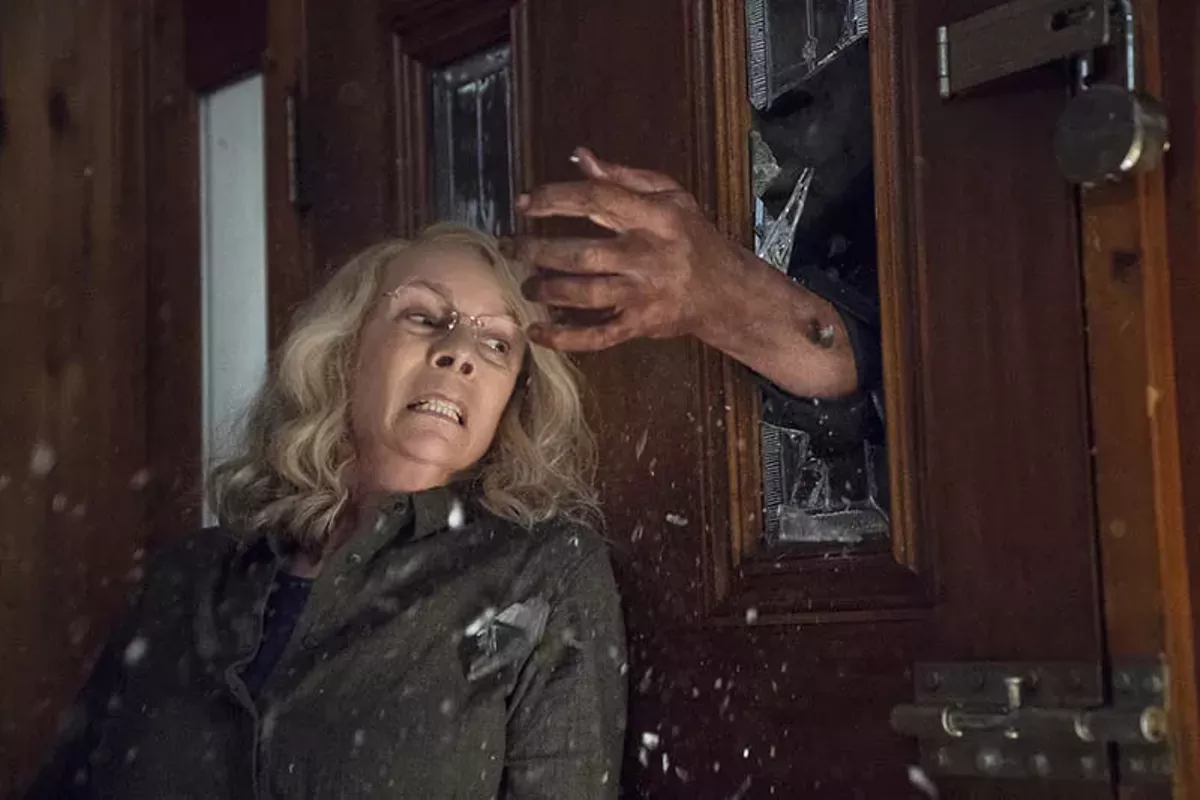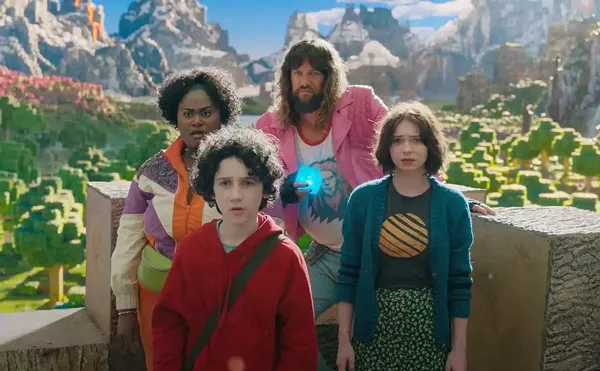Early in the new sequel (reboot?) of John Carpenter's Halloween, a journalist (Jefferson Hall) approaches the 40-years-incarcerated Michael Myers — speaking, as the script seems to imply, for fellow fans of the original. "I'd like to know more about that night," he says, brandishing Michael's mask. "Do you ever think about them, Michael? [Do you] feel guilt about their fate?"
While he accosts the mute serial killer like an entitled Comic-Con fanboy, the other prisoners in the yard begin whooping and hollering as the movie cuts rapidly between their stricken, pockmarked faces. They stir and howl as the man shouts louder and louder, the scene attempting (and botching) a crescendo while striving for dramatic effect. Most of the movie is paced like this, with thematic threads paraded out and then forgotten amid a perfunctory ruckus of flashily overcut scenes. But these questions ("What does Michael think? Will he talk? How does he feel? Why's everyone so hung up on what happened that night 40 years ago?") feel more like dead-end rhetoricals — and as such are not, and likely cannot, be fully explored.
After some 20 minutes of characters gushing and wondering about "that night" [read: the first film] in varying settings while wondering aloud why anyone should bother, the movie trots with newfound urgency into restaging the events in question. I'll spoil nothing by saying that Michael escapes captivity, setting out after Laurie Strode — the one that jailed him and got away — while dropping numerous bodies on his circuitous route.
As reprised by Jamie Lee Curtis here, Laurie maintains her trademark morality and sincerity, showing affection for her daughters and granddaughters by building a sizeable cache of weapons, jarred foods, and home surveillance equipment for the event of an eventual and (as she perceives) inevitable attack. It takes bribes and guilt trips to drive her to social interaction, and her overprotectiveness is severe enough that she lost custody of her daughter Karen (Judy Greer) after subjecting her to grueling combat training sessions from a young age.
Though this suggests a cycle of traumatization spanning generations, Laurie is never granted the respectful distance one might hope — some spectators even ask if she'd talk to Michael while he's jailed. Though a survivor of personal and familial trauma (and seeming never to have sought any kind of psychiatric "help"), she's dismissed, even by herself, as "a basket case." Her wisdom, even regarding simply surviving on her own terms, is questioned constantly, while even the community that fixates on her trauma demands to know why, after so many years, she's failed to move on. "I've waited for him and he's waited for me," she says with a weirdly ardent air.
Rivaling Isabelle Huppert as one of the screen's true icons of female resilience, trauma, and survival, Curtis' casting is a genuine gift, granting some weight to the expectant air preceding Laurie and Michael's collision. But that's mostly just a matter of expectation; co-writers David Gordon Green (Pineapple Express; he also directs here) and Danny McBride (Eastbound & Down, Vice Principals) treat this film's events as her self-proclaimed destiny and her reason for being, and though she's twice divorced since the events of 1978, the filmmakers show little interest here in the kind of life that's occurred between. Laurie flutters in and out of rooms, scowls at strangers, compulsively drinks just a little — and gives little insight into what a post-traumatic experience might actually be like. In short, she acts like a received set of cliches.
When the camera isn't watching Michael plow through victims or crudely restaging scenes from the original (a walk home from school, an attack on a babysitter), it bides its time on family dynamics. "The world is not a dark and evil place," Karen chides Laurie. "It's full of love and understanding." By surrounding Laurie with such narrative straw men and women, Green and McBride attempt to elevate Laurie. But if they really respected her, they'd present her with real challenges and better peers — and better daughters. The real story should be in her life and mind, not Michael's, and we get very little of it.
We do get a lot of Michael, though, whose focus on Laurie likewise seems to wander. And this is where the film seems most invested: in the sport of Michael's chase. Where the first film's mobile camera joined the viewer in Michael's perspective if not his psychology, this one cuts swiftly between close-ups to give you the details of his murders with little eye toward each broader scene and a particular eagerness in watching female victims. Two opposite-sex pairs (one man, one woman) die by Michael's knife early on; in each, the women are luxuriated over by the camera, drawing out the suspense before their realizations of what's coming. In both, we're given shots of the women begging and pleading, dragging their bodies (the camera's italics, not mine) across the floor. The men's killings, meanwhile, are quick, rough struggles if they're shown at all (more often than not, they occur offscreen) — and something ugly seems to be at work there.
This movie lacks, along with much else, the help of Debra Hill, who co-wrote and produced the first Halloween and several after — and also, it seems, who knew how to write women well. Considerate male writers can write women well, but Green and McBride seem to be more about the murders — and the film's primary male perspective — taking from Game of Thrones the notion of a high body count as a mark of seriousness. But in reality, it's a dodge — a way of sidestepping the tough tasks of creative rigor, thought, or emotional digging.
Michael's weapon falls, even in the scenes Green cares for, on constructs instead of characters. The filmmakers' investment seems less in the conflict between two opposing forces than in the power trip of Michael's position, in seeing other people as sport. But they don't know how to make it more complicated or tactile, or any more real than that — any more than they understand Laurie's psychology. If the characters live only for what takes place onscreen, then they live solely to die, which makes Green and McBride's game here feel like a cheap sport.
Stay on top of Detroit news and views. Sign up for our weekly issue newsletter delivered each Wednesday.







